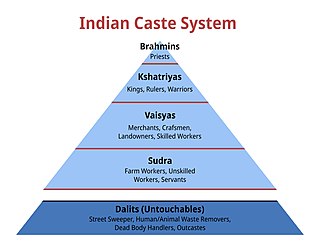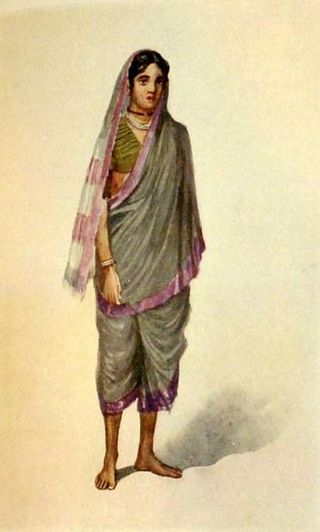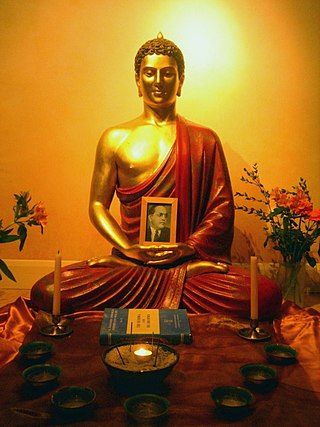Related Research Articles

Bhimrao Ramji Ambedkar was an Indian economist, jurist, social reformer and political leader who chaired the committee that drafted the Constitution of India based on the debates of the Constituent Assembly of India and the first draft of Sir Benegal Narsing Rau. Ambedkar served as Law and Justice minister in the first cabinet of Jawaharlal Nehru. He later renounced Hinduism, converted to Buddhism and inspired the Dalit Buddhist movement.

The Dalit Buddhist movement is a religious as well as a socio-political movement among Dalits in India which was started by B. R. Ambedkar. He re-interpreted Buddhism and created a new school of Buddhism called Navayana. The movement has sought to be a socially and politically engaged form of Buddhism.

Dalit is a term used for untouchables and outcasts, who represented the lowest stratum of the castes in the Indian subcontinent. They are also called Harijans. Dalits were excluded from the fourfold varna of the caste hierarchy and were seen as forming a fifth varna, also known by the name of Panchama. Several scholars have drawn parallels between Dalits and the Burakumin of Japan, the Baekjeong of Korea and the peasant class of the medieval European feudal system.

Mahar is an Indian caste found largely in the state of Maharashtra and neighbouring areas. Most of the Mahar community followed B. R. Ambedkar in converting to Buddhism in the middle of the 20th century. As of 2017 the Mahar caste was designated as a Scheduled Caste in 16 Indian states.

Pandita Ramabai Sarasvati was an Indian social reformer and Christian missionary. She was the first woman to be awarded the titles of Pandita as a Sanskrit scholar and Sarasvati after being examined by the faculty of the University of Calcutta. She was one of the ten women delegates of the Congress session of 1889. During her stay in England in early 1880s she converted to Christianity. After that she toured extensively in the United States to collect funds for destitute Indian women. With the funds raised she started Sharada Sadan for child widows. In the late 1890s, she founded Mukti Mission, a Christian charity at Kedgaon village, forty miles east of the city of Pune. The mission was later named Pandita Ramabai Mukti Mission.

Gail Omvedt was an American-born Indian sociologist and human rights activist. She was a prolific writer and published numerous books on the anti-caste movement, Dalit politics, and women's struggles in India. Omvedt was involved in Dalit and anti-caste movements, environmental, farmers' and women's movements, especially with rural women.

Navayāna, otherwise known as Navayāna Buddhism, refers to the socially engaged school of Buddhism founded and developed by the Indian jurist, social reformer, and scholar B. R. Ambedkar; it is otherwise called Neo-Buddhism and Ambedkarite Buddhism It is not any new sect, it is rather application of Buddhist principles for the welfare of many.
C. Iyothee Thass was an Indian anti-caste activist and a practitioner of Siddha medicine. He famously converted to Buddhism and called upon the Paraiyars to do the same, arguing that this was their original religion. He also founded the Panchamar Mahajana Sabha in 1891 along with Rettamalai Srinivasan. Panchamas are the ones who are outcastes.
Bapu Chandrasen Kamble was an Indian politician, writer, editor, jurist, and social activist. He is also an Ambedkarite thinker, translator and biographer. Kamble was the leader of Republican Party of India (Kamble). He is from Maharashtra. He has written a Marathi biography of B. R. Ambedkar called "Samagra Ambedkar Charitra".

Jai Bhim is a slogan and greeting used by followers of B. R. Ambedkar, an Indian politician, social reformer and first Law and Justice Minister of India. It refers to Ambedkar's given name Bhimrao. In 1935, Jai Bhim was conceived and developed by Babu L. N. Hardas (1904–1939), a staunch follower of Ambedkar, and the secretary of Samata Sainik Dal. However, its origin is obscure and may date as far back as 1818, well before Ambedkar's birth.
Dalit literature is a genre of Indian writing that focuses on the lives, experiences, and struggles of the Dalit community over centuries, in relation to caste-based oppression and systemic discrimination. This literary genre encompasses various Indian languages such as Marathi, Bangla, Hindi, Kannada, Punjabi, Sindhi, Odia and Tamil and includes narrative-styles like poems, short stories, and autobiographies. The movement started gaining influence during the mid-twentieth-century in independent India and has since spread across various Indian languages.

Eleanor Zelliot was an American writer, professor of Carleton College and specialist on the India, Southeast Asia, Vietnam, women of Asia, Untouchables, and social movements.

Dr Savita Ambedkar, was an Indian social activist, doctor and the second wife of B.R. Ambedkar.
Baby Kamble, commonly known as Babytai Kamble, was an Indian activist and writer. She was born into an untouchable caste, Mahar, the largest untouchable community in Maharashtra. She was a well-known Dalit activist and writer who was inspired by B. R. Ambedkar, prominent dalit leader. Kamble and her family converted to Buddhism and remained lifelong practicing Buddhists. In her community, she came to be admired as a writer and was fondly called as Tai. She is widely remembered and loved by the Dalit community for her contributions of powerful literary and activist work. She is one of the earliest women writers from the untouchable communities whose distinctive reflexive style of feminist writing setting her apart from other Dalit writers and upper caste women writers who gaze was limited and reflexivity incarcerated in caste and masculinity.

Ambedkarism is called as the teaching, ideology or philosophy of B.R. Ambedkar, an Indian economist, barrister, social reformer, and the first of Minister of Law and Justice in the first cabinet of Jawaharlal Nehru. Ambedkarism includes special focus on subjects such as fraternity, democracy, communal electorates, conversion out of Hinduism, political power, rule of law, Navayana, among others. An Ambedkarite is one who follows the philosophy of Ambedkar. Icons of Ambedkarite ideology also include Periyar, Jyotirao Phule and others.
Baudhacharya Shanti Swaroop Baudh was an Indian writer, Buddhist scholar, painter, publisher and Pali language expert. He was an Ambedkarite-Buddhist activist. He was born in 1949 at Old Delhi in a Jatav Dalit family. In 1975, he set up Samyak Prakashan, a publishing house dedicated to Ambedkarite, Navayana Buddhist, Pali literature and Dalit literature. Samyak Prakashan has published over 2000 books many of which have been translated into some 14 different languages including English, Sinhalese, Nepalese, Burmese. He was a board of editors member of Dhamma Darpan and Dalit Dastak magazines. He was Delhi state president of Buddhist Society of India.

Yashwant Bhimrao Ambedkar, also known as Bhaiyasaheb Ambedkar, was an Indian socio-religious activist, newspaper editor, politician, and activist of Ambedkarite Buddhist movement. He was the first and only surviving child of Ramabai Ambedkar and B. R. Ambedkar, Indian polymath, human rights activist, and the first law minister of India. Yashwant devoted his life to Buddhism after the demise of his father and kept pace his father's struggle for social equality. He tried to keep the Ambedkarite community united and also took an active part in the Dalit Buddhist movement.
Namdeo Chandrabhan Kamble is an Indian Marathi-language writer, social worker, journalist and teacher. He was awarded the Sahitya Akademi Award in 1995 for his novel Raghav Vel. He was awarded Padma Shri in the field of literature and education in 2021.
Wandana Sonalkar is an Indian economist, and an author and translator. She retired as Professor teaches at the Tata Institute of Social Sciences, Mumbai in 2017, and previously taught at the Babasaheb Ambedkar Marathwada University, Aurangabad. Her research focuses on gender and caste in India. She has published translations of several books from Marathi to English, including the autobiographies of Urmila Pawar and R.B. More, and in 2021, she published Why I am Not a Hindu Woman, an autobiography and critique of misogyny, caste and violence in the context of the Hindu religion.
References
- ↑ "Dalit Lives Matter: 8 Dalit Women Activists You Must Know About". Geetika Sachdev. Yahoo. 14 October 2020. Retrieved 15 November 2020.
- ↑ "Peoples Voice » when Nehru helped an Ambedkarite Sanskrit Scholar get a job". Archived from the original on 2021-04-14. Retrieved 2021-01-25.
- ↑ "How three generations of Dalit women writers saw their identities and struggle?". 27 December 2017.
- ↑ "Meet Dr Kumud Sonkuwar Pawde, Sanskrit Pandita And Dalit Activist". Kalwyna Rathod. Femina. 2 November 2020. Retrieved 15 November 2020.
- ↑ "The Dalit girl who became a Sanskrit Pandita: the incredible story of Dr Kumud Sonkuwar Pawde". Sagarika Ghose. The Times of India. 25 March 2019. Retrieved 15 November 2020.
- ↑ "EVALUATION OF DALIT LITERATURE IN INDIA" (PDF). YESUPAKU DINESH. Pune Research. Retrieved 15 November 2020.
- ↑ "Social, Economic and Political Reverberations of Untouchability: Kumud Pawde's "The Story of My Sanskrit"". Jayasree, K. IUP Journal of English Studies. Retrieved 15 November 2020.